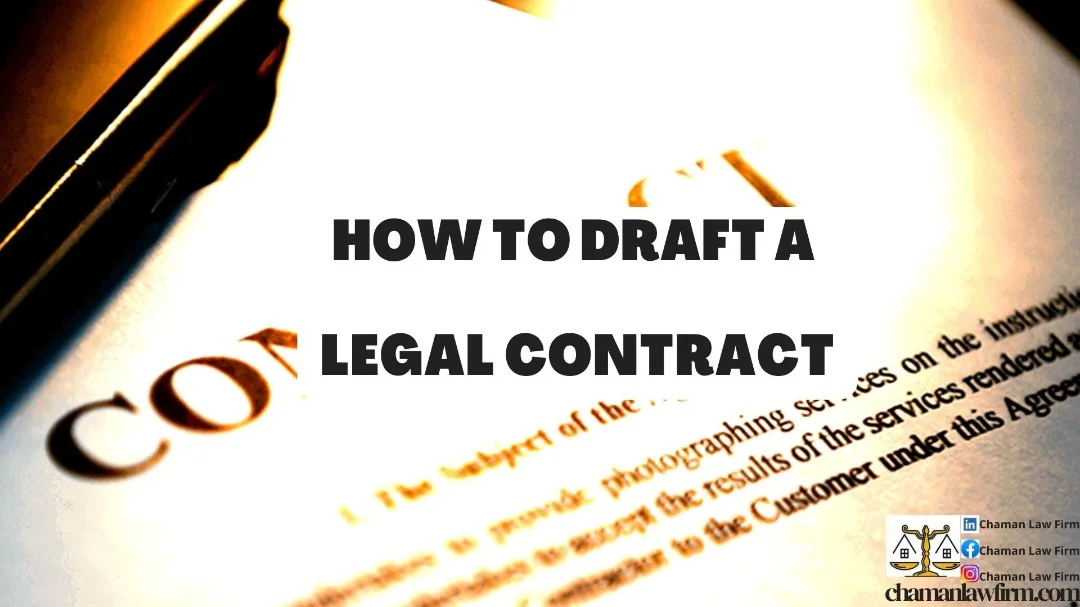How to Draft Legal Contract
Introduction
Drafting a legal contract is a fundamental skill in law and business, forming the backbone of enforceable agreements between parties. Contracts clarify expectations, allocate risk, and provide legal recourse if obligations are not fulfilled. Whether you are a legal practitioner, entrepreneur, or business executive, understanding how to draft a legal contract accurately is essential to protecting your interests. Poorly drafted contracts can lead to disputes, financial losses, and even reputational damage. This guide will walk you through everything you need to know to draft a legally sound, enforceable, and effective contract.
Understanding a Legal Contract
A legal contract is a written or spoken agreement that is enforceable by law. It involves two or more parties who agree to perform or refrain from performing certain acts. Contracts create legally binding obligations and are governed by contract law, which varies slightly by jurisdiction but generally upholds similar foundational principles. Contracts are used across industries and sectors to manage business relationships, define terms of service, outline employment responsibilities, and more.
Key Elements of a Valid Contract
For a contract to be legally binding, it must contain certain essential elements:
Offer: One party must present terms to another party.
Acceptance: The other party must agree to the offer.
Consideration: Something of value must be exchanged.
Mutual Intent: All parties must intend to enter a binding agreement.
Capacity: Parties must have the legal ability to contract.
Legality: The contract’s subject matter must be legal.
These elements ensure that each party willingly agrees to the terms and can be held accountable if those terms are violated.
Types of Legal Contracts
There are various types of legal contracts, each serving specific purposes:
Employment Contracts
Lease and Rental Agreements
Sales and Purchase Agreements
Service Contracts
Non-Disclosure Agreements (NDAs)
Partnership Agreements
Construction Contracts
Licensing Agreements
Understanding the nature of your transaction helps determine the type of contract to draft and the clauses it should include.
Step-by-Step Guide to Drafting a Legal Contract
Identify the Parties: Clearly identify the individuals or entities entering the agreement. Use full legal names, titles, business registration numbers (if applicable), and addresses.
Define the Purpose: State the purpose and nature of the agreement. This background provides context for the terms that follow.
Outline Terms and Conditions: Lay out the specific obligations, deliverables, timelines, pricing, payment terms, and responsibilities of each party. Be clear and unambiguous.
Include Representations and Warranties: These are statements of fact or promises that are relied upon when entering into the contract.
Add Confidentiality Clauses: If sensitive information will be shared, include non-disclosure terms to protect privacy.
Specify Term and Termination: Define how long the contract will remain in effect, renewal terms, and conditions under which it can be terminated.
Detail Dispute Resolution Methods: State how disputes will be resolved, whether through litigation, arbitration, or mediation.
Include Indemnification and Liability Clauses: Specify who is responsible for damages, losses, or breaches.
Add Governing Law and Jurisdiction: Indicate the laws that will govern the contract and the court or location that will hear disputes.
Include Signatures and Dates: Ensure all parties sign and date the agreement. Witnesses or notarization may also be required.
Common Clauses Found in Contracts
Force Majeure: Excuses parties from performance due to extraordinary events.
Severability: States that if one part of the contract is invalid, the rest remains effective.
Entire Agreement: Specifies that the contract is the complete understanding between parties.
Amendment: Details how changes can be made to the contract.
Assignment: Explains whether the agreement can be transferred to others.
Legal Considerations and Pitfalls to Avoid
Avoid vague language. Be clear and precise to prevent misinterpretation.
Never assume verbal agreements are enough; always document terms in writing.
Do not use boilerplate contracts without reviewing their relevance.
Ensure compliance with applicable laws and regulations.
Watch for imbalance in obligations; contracts should be fair and reciprocal.
Contract Review and Execution
After drafting, thoroughly review the contract for completeness and clarity. Verify that all parties understand and agree to the terms. Legal counsel should examine the document before execution to ensure enforceability and compliance. Once finalized, all parties must sign and date the contract, and each should keep a copy for recordkeeping.
Importance of Legal Counsel
While templates and DIY contracts are accessible online, they can never replace the insight of a qualified legal practitioner. Lawyers understand the legal nuances, can anticipate risks, and ensure that your contract aligns with current laws and best practices. Relying solely on self-drafted documents could expose you to liabilities and missed protections.
Sample Contract Structure
Title of the Agreement
Date of Execution
Parties Involved
Recitals or Background
Definitions
Terms and Conditions
Representations and Warranties
Confidentiality
Dispute Resolution
Governing Law
Miscellaneous Provisions
Signature Blocks
This template helps maintain organization and ensures nothing important is left out.
Conclusion
A well-drafted legal contract protects your interests, minimizes risks, and fosters healthy business relationships. Always write in plain, unambiguous language. Keep the reader in mind and ensure that terms are reasonable and transparent. Do not rush the process—take the time to consider future outcomes and potential areas of conflict.
Call to Action
At Chaman Law Firm, we do not just draft contracts — we build legal shields that protect your hard-earned assets, business ventures, and professional relationships.
📌 Whether you are purchasing property, entering into a partnership, hiring staff, or sealing a multimillion-naira transaction, the strength of your contract determines your peace of mind.
🚨 Don’t wait until a dispute arises before involving a lawyer. Prevention is cheaper — and smarter — than litigation.
📞Phone: 08065553671, 08096888818
✉ Email: chamanlawfirm@gmail.com
📍 Address: 115, Obafemi Awolowo Way, Allen Junction, Ikeja, Lagos, Nigeria


